
Climate change will expose mammals to an array of stressors, some new, and some with increased frequency and severity. Those stressors influence endocrine and metabolic function, with potential consequences for the survival and persistence of mammalian species. Here, we review the similar consequences of climate change on the physiological function of terrestrial mammals, including direct effects of increasing air temperatures and reduced water availability, as well as the indirect effect of reduced or unpredictable food supply. Understanding the mechanisms through which function is altered and the capacity for mammals to maintain homoeostasis in a changing environment is essential for predicting the impact of climate change on mammals and implementing appropriate conservation actions.
